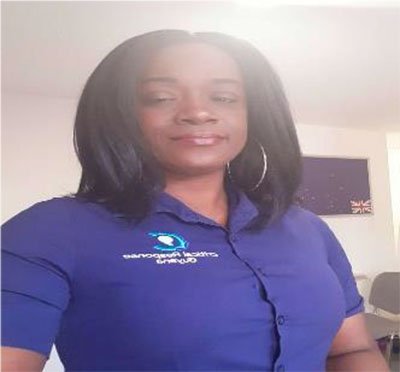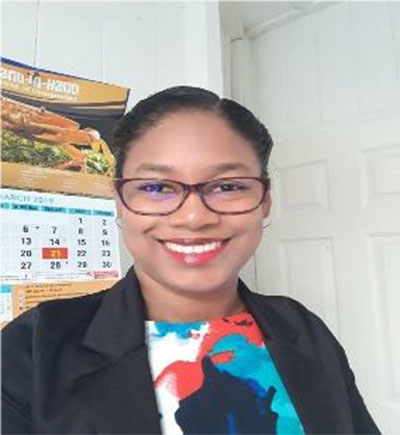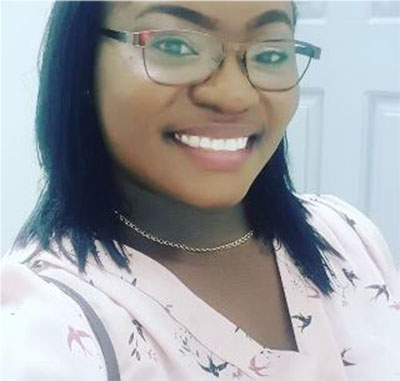With COVID-19 wreaking havoc worldwide and many countries imposing mandatory lockdowns and encouraging self-isolation, mental health is increasingly becoming a problem. Cognizant of this, a local non-governmental organisation has expanded its service to provide mental care virtually for persons, not only Guyana but in other countries.
“Self-isolation, after a few days, can begin to feel like a prison with an indefinite sentence. It is possible to feel deeply and profoundly alone,” Petra Richmond, founder of Critical Response Guyana (CRGY) told Stabroek Weekend recently.
Richmond is currently pursuing a master’s degree in Applied Psychology in Health and Forensic Psychology at the University of Bedfordshire, England, and the CRGY has put together a number of professionals who will cater for the needs of person who may need psychosocial assistance.
“The outbreak of coronavirus (COVID-19) may be stressful for people. Fear and anxiety about the disease can be overwhelming and cause strong emotions in adults and children,” she told this newspaper from the United Kingdom where there is a mandatory lockdown.
Universities in that country are closed and studies are being done online and while most of Richmond’s colleagues are at home, she still goes to work as she is working with a charity that provides mental health care and the service is seen as critical.
Critical Response Guyana focuses on youth mental health and suicide prevention but with the advent of COVID-19 and the threat that it poses to the vulnerable, the organistaion is now extending its services to include the entire population.
“To adequately meet the needs of those affected, CRGY has so far recruited social workers, psychologists (both child and adolescent) and mental health specialists who will be able to answer questions, provide advice, counselling and support. These services are available to individuals in isolation who are feeling overwhelmed with emotions like sadness, depression, or anxiety, or feel like they want to harm themselves or others,” Richmond said.
She explained that such services are extremely critical since persons with mental health issues, chronic diseases and other challenges, such as drug and alcohol addiction may feel isolated, lonely, confined and confused. This could lead to an escalation of circumstances, triggering agitation and violent reactions and may push persons to self-harm or harm others.
“Children, women and the elderly are also extremely vulnerable at this point in time when systems are crippled because nations were not adequately prepared to handle such a crisis,” she added.
CRGY’s services can be accessed via the Critical Response Guyana Facebook page – persons will be added once a request is sent – WhatsApp, SMS, Skype and other social media channels.
Richmond is advising persons who are in self-isolation to be proactive, start something new, manage their moods, stay connected, focus on their health, abstain from alcohol and manage their media consumption.
She encouraged that persons could start by identifying the things that they can control and then make a plan; they could also start new projects that spark their intrinsic motivation and curiosity.
“It is important to note that moods and feelings are manageable, so, being aware of what you are feeling, and trying to understand why you are experiencing these feelings is the first step to putting you back in control,” she further encouraged.
The affected person, whether they are an introvert or extrovert, should use text video chat, social media or phone to stay connected to another human being.
“In particular, it is good to share what you feel. While a problem shared may not be a problem halved, there is a host of research to support that sharing concerns with trusted others has significant positive psychological benefits,” Richmond said.
She warned that quarantine and isolation can be stressful, and stress weakens one’s immune system and so being proactive about staying healthy becomes even more important. “Stick to regular meals with the correct nutritional variety and avoid snacking,” she encouraged.
Consuming too much media in a crisis situation can be associated with increased levels of experienced stress and as such Richmond suggests that persons restrict their consumption of news, avoid social media and depend on traditional national media with direct lines to the trustworthy medical decision-makers when accessing news.
‘Coping well’
Meanwhile, Richmond said that she has been coping well with the lockdown in the United Kingdom.
Virtual learning, she said, “…can be a very challenging situation as systems sometimes fail and frustrated students will just tune off. You really have to push yourself to stay focused and not give in to despair, anxiety and fear.”
She explained that a Guyanese Chevening WhatsApp group in the UK has been created and through it they keep each other informed as they share articles and just news generally on what’s happening and how to stay safe. Richmond said they are also supporting, entertaining and keeping each other sane.
“I would say get into groups, comfort and support each other. Spend quality time speaking with friends and family. Do not be too much alone as this can be harrowing for your mental health,” she encouraged students studying in other countries.
“Find interesting ways to stay connected. Focus on the reason why you have travelled abroad, which is your education and make your health a priority. Remember you cannot control the situation so it is best to adapt quickly and work on those factors that you can control,” she added.
Richmond is employed by MacIntyre Charity in the UK which is a mental health foundation that provides 24-hour care and support for individuals with mental health challenges.
She explained that persons being supported by the charity are unable to live on their own due to the severity of their mental health issues and because they are essential workers they have to work, despite the lockdown.
“It is challenging to support individuals with mental health under these circumstances as they can become anxious and even violent when they are restricted from their normal routine,” she said of her job.
And it can also become a very scary situation travelling in buses and trains, with persons still behaving in an irresponsible manner towards the virus, Richmond noted.
For her everything has changed as there is even social distancing in the workplace and only two staff can be in a room at any given time.
“The system is under severe pressure due to persons leaving when the outbreak started. We are being asked to take on extra hours to cover the individuals that we support. It is tough times, but I just try to stay positive and remember that this is the reason why I started psychology in the first place. I will not bail and abandon those I care for at the first sight of trouble,” Richmond said.
She believes in the long run her experience will definitely change her for the better as the opportunity for practical training had been incredible.
“I have great ideas about how to advance care and treatment for people with mental health challenges, what laws needs to change and how and I have had training in various other areas. I have talked a whole lot about mental health before, but I have never worked in an actual system that supports it. Given that it is an advanced system, there is so much to take back with me to Guyana,” she added.
To access the services provided by CRGY persons can contact Abegail Heywood, a social worker on 626-4035, Pastor Alexander Vickerie, who is also a social worker on 664-9152, Petra Richmond on +4407784929018 and social worker Marcia Washington on 663-5414. Additionally, services are also being provided by social worker Vanata Ragghu-Prashad on 683-5913, child and adolescent psychologist Michelle Amsterdam on 684-0925 and Abiola Robinson who is a pastor and a teacher on 609-3808.









